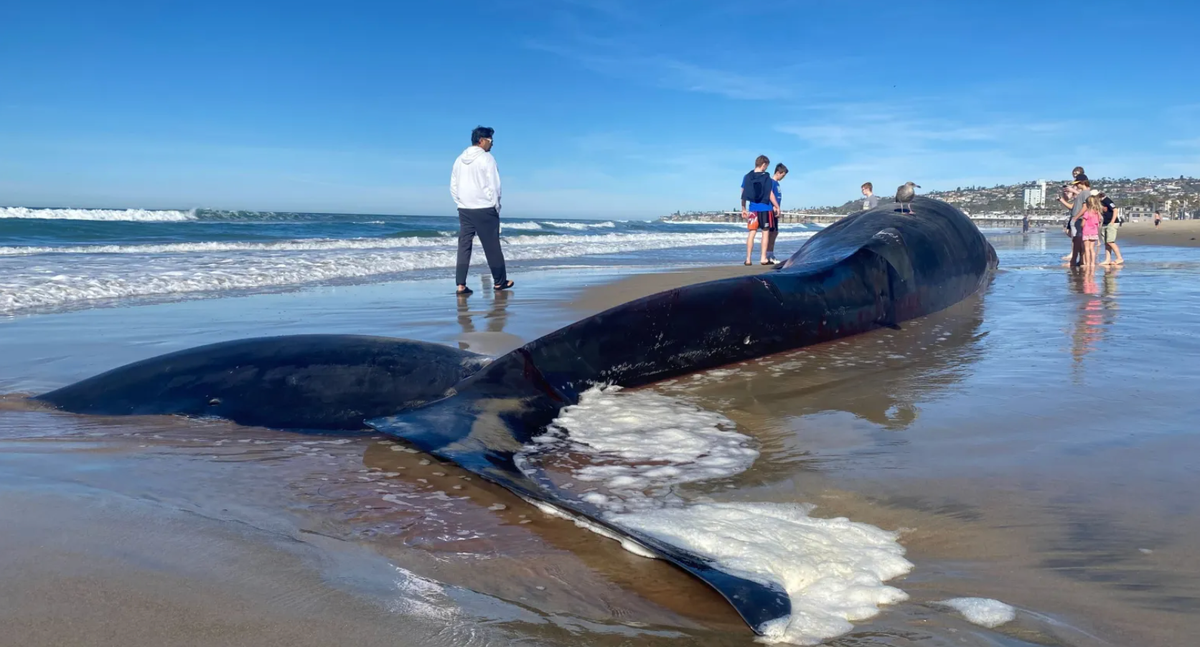
A dead 52-foot fin whale was found washed up on a San Diego beach, with members of the public advised to keep their distance from the animal.
The whale washed up one Sunday morning off of Santa Rita Place near the border of Mission Beach and Pacific Beach.
Dozens of spectators were seen gathering near the animal, which appeared to be bleeding from its side, with some running up and touching it. They were later advised to stay away by lifeguards.
One of the warnings included: “Once again we need you to stay away from the whale. Lifeguards are requesting that and NOAA fisheries is requesting that you do not touch the mammal,” according to NBC San Diego.
Personnel from the San Diego Fire and Rescue Department, including firefighters and lifeguards, and the San Diego Police Department were seen surrounding the whale.
Members of the public were warned not to approach or touch the animal by life guards— (Dana Williams/ NBC 7 San Diego)
They were later joined by researchers from NOAA (National Oceanic and Atmospheric Administration), who worked with lifeguards to create a perimeter around the whale. The researchers were seen taking photos and collecting data.
Lifeguards later attempted to tow the whale back out to the ocean by connecting its tail to a small boat, but it was unsuccessful, according to NBC.
Michael Milstein, a public affairs officer with NOAA, said the whale is a female juvenile, but that it was not immediately clear how it had died.
He told The Independent that the blood seen on the whale’s side was likely from birds pecking at it, as there were no propeller marks or gashes typical of being hit by a vessel.
Mr Milstein said while they encourage people to appreciate the whale, they warned bystanders and pets to stay away from it and give researchers their space.
Because the cause of death is still unknown, the whale could have an underlying illness, he added.
“It's really hard to speculate,” he told The Independent.
“The samples would be valuable in the sense that they could contribute in terms of our big picture sense of the species, but it's not going to tell us a lot more about this specific whale or why it came ashore.”
Mr Milstein added: “It is a reminder that we have pretty incredible marine life living just offshore of a very populated area and to the extent that we realize that these animals are out there using that habitat, is important.
“I think a lot of people care about knowing that they're out there – fin whales are occasionally spotted by whale watching boats and so forth but again, it's less common than some of the other species like humpbacks.”
The fin whale is the second largest whale species behind the blue whale and is considered endangered.
Audrey Hagger, a marine biologist, who had been walking on the beach with her father, told NBC: “It’s definitely something that I feel like never really happens on, like, public beaches. I feel like not many people see it very often. It’s unfortunate.”
Offering insight into what might have happened, Ms Hagger continued: “They either beach themselves if they’re sick or they’ll float up naturally if they die in the wild.”
Cynthia Polis, a nearby resident, added: ”We’ve lived here for a long time. This is the first time we’ve ever seen this so it’s heartbreaking," Ms Polis said.
NOAA is working to remove the whale from the beach as soon as possible. The agency plans to tow it off-shore, with the help of high-tide and heavy equipment, and let it sink.







